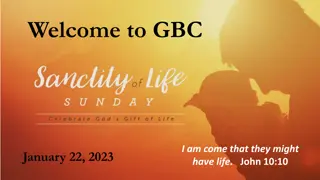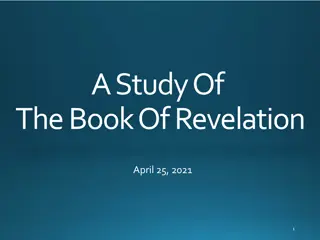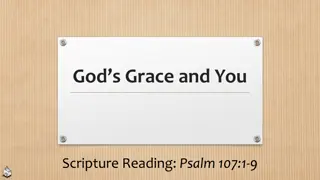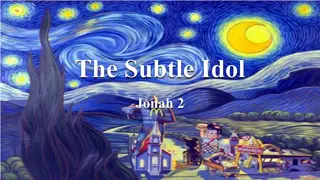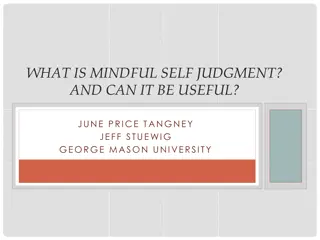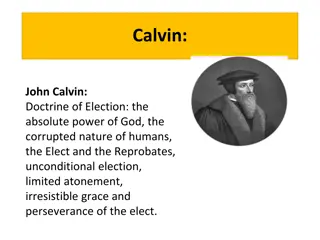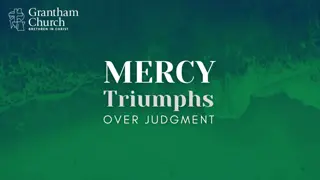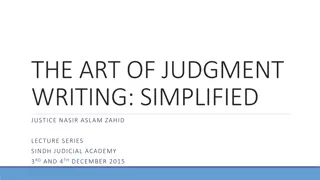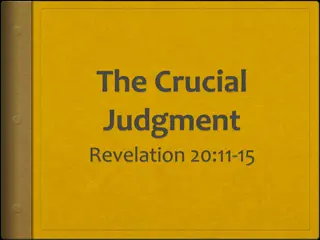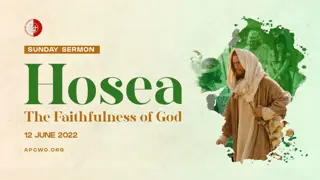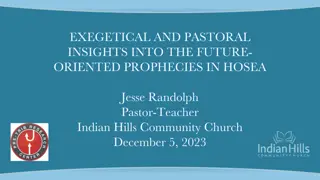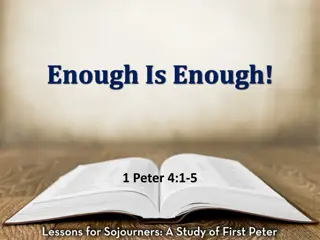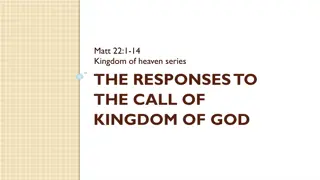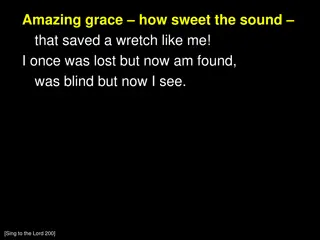The Book of Hosea: Adultery, Judgment, and God's Grace
Explore the themes, political background, and key verses of the Book of Hosea. Hosea, a prophet during a time of Israel's unfaithfulness, delivers a message of judgment and repentance amidst political turmoil. Discover the significance of Hosea's prophecies and the call for Israel to turn back to God's mercy.
Download Presentation

Please find below an Image/Link to download the presentation.
The content on the website is provided AS IS for your information and personal use only. It may not be sold, licensed, or shared on other websites without obtaining consent from the author. Download presentation by click this link. If you encounter any issues during the download, it is possible that the publisher has removed the file from their server.
E N D
Presentation Transcript
HOSEA: HOSEA: Adultery, Judgment Adultery, Judgment and God s Grace and God s Grace
Hosea: The Basics Hosea: The Basics Name of Book: Hosea Author: Hosea. Verse 1: The word of the LORD which came to Hosea Meaning of author s name: Salvation When written: 755-710 B.C. Contemporary of Amos, Micah, and Isaiah.
Hosea: Themes Hosea: Themes Israel s unfaithfulness in worshiping idols, particularly the Canaanite fertility god Baal. Israel s reliance on her military prowess as well as her alliances with heathen nations. God s punishment and faithfulness. Israel s redemption.
Hosea: Political Background Hosea: Political Background Hosea begins his ministry in the latter part of the very long reigns of King Jeroboam of the Northern Kingdom, and King Uzziah of the Southern Kingdom of Judah. During their reigns, both kingdoms were experiencing significant prosperity.
Hosea: Political Background Hosea: Political Background However, those days faded and Israel s fortunes turned greatly. Much of the reason for this change of fortunes was Israel s disgraceful idolatry. Israel s sin is overt, reckless, and odious to the Lord who birthed the nation.
Hosea: Political Background Hosea: Political Background God has been patient with His people, but His patience is wearing thin. It is the job of the prophet Hosea to condemn the great sin of the Israelites and to preach a message of both judgment and repentance.
Hosea: Key Verses Hosea: Key Verses Hosea 4:6: My people are destroyed for lack of knowledge. Because you have rejected knowledge, I also will reject you from being My priest. Since you have forgotten the law of your God, I also will forget your children.
Hosea: Key Verses Hosea: Key Verses Hosea 6:6: For I desire mercy, not sacrifice, and the knowledge of God rather than burnt offerings. Hosea 10:13: You have plowed wickedness, you have reaped injustice, you have eaten the fruit of lies. Because you have trusted in your way, in your numerous warriors, therefore a tumult will arise among your people, and all your fortresses will be destroyed.
Hosea: New Testament References Hosea: New Testament References Hosea 2:1, 3: Romans 9:25-28 Hosea 6:6: Matthew 9:13; 12:7 Hosea 10:8: Luke 23:30; Revelation 6:16 Hosea 11:1: Matthew 2:15 Hosea 13:14: 1 Corinthians 15:55
Hosea: His Marriage Hosea: His Marriage Hosea 1:2-3: the LORDsaid to Hosea, Go, take to yourself a wife of harlotry and have children of harlotry; for the land commits flagrant harlotry, forsaking the LORD. So he went and took Gomer the daughter of Diblaim.
Hosea: His Marriage Hosea: His Marriage Knowing how much the Lord abhors adultery, would He really order anyone, let alone a prophet of Israel, to marry an adulteress woman? Is there another explanation?
Hosea: His Marriage Hosea: His Marriage Here is one other point to ponder regarding the three children Gomer bore. Scholars agree that the first child, Jezreel, was indeed Hosea s son as we read that Gomer bore him[Hosea] a son (1:3). But, in the births of the next 2 children, Lo- Ruhamah and Lo-Ammi, we read that Gomer gave birth to a daughter (v. 6) and gave birth to a son (v. 8).
Hosea: His Marriage Hosea: His Marriage Notice how following the words gave birth, the word him is omitted. Therefore, some scholars are of the opinion that though child number 1 belonged to Hosea, children numbers 2 and 3 were conceived by Gomer in her adultery.
Hosea: His Marriage Hosea: His Marriage Whether true or not, Hosea is given another mighty and emotionally taxing command by the Lord: Go, show your love to your wife again, though she is loved by another man and is an adulteress. Love her as the LORD loves the Israelites, though they turn to other gods (3:1).
Hosea Synopsis: Chapter 2 Hosea Synopsis: Chapter 2 Chapter 2 serves as an overview of the entire Book of Hosea. Verses 1-13 deal with God s casting off of Israel because of her sin, specifically, that of idolatry, which the Lord likens to adultery.
Hosea Synopsis: Chapter 2 Hosea Synopsis: Chapter 2 Verse 2: A Call to Action Contend with your mother, contend, for she is not my wife, and I am not her husband; and let her put away her harlotry from her face and her adultery from between her breasts
Hosea Synopsis: Chapter 2 Hosea Synopsis: Chapter 2 Verse 3: Or Else Or I will strip her naked and expose her as on the day when she was born. I will also make her like a wilderness, make her like desert land and slay her with thirst.
Hosea Synopsis: Chapter 2 Hosea Synopsis: Chapter 2 Israel s Restoration, Verses 18-20 In that day I will also make a covenant for them with the beasts of the field, the birds of the sky and the creeping things of the ground. And I will abolish the bow, the sword and war from the land, and will make them lie down in safety.
Hosea Synopsis: Chapter 2 Hosea Synopsis: Chapter 2 I will betroth you to Me forever; yes, I will betroth you to Me in righteousness and in justice, in lovingkindness and in compassion, and I will betroth you to Me in faithfulness. Then you will know the LORD.
Hosea Synopsis: Chapter 3 Hosea Synopsis: Chapter 3 The theme is restoration. Just as Hosea s marriage is to be restored, so will Israel s relationship with God be restored at the end of the age. V. 5: Afterward the sons of Israel will return and seek the LORD their God and David their king; and they will come trembling to the LORD and to His goodness in the last days.
Hosea Synopsis: Chapter 4 Hosea Synopsis: Chapter 4 The theme of idolatry is summed up in the middle of the chapter, verses 11-14: Harlotry, wine and new wine take away the understanding. My people consult their wooden idol, and their diviner s wand informs them; for a spirit of harlotry has led them astray, and they have played the harlot, departing from their God.
Hosea Synopsis: Chapter 4 Hosea Synopsis: Chapter 4 They offer sacrifices on the tops of the mountains and burn incense on the hills, under oak, poplar and terebinth, because their shade is pleasant. Therefore your daughters play the harlot and your brides commit adultery.
Hosea Synopsis: Chapter 4 Hosea Synopsis: Chapter 4 I will not punish your daughters when they play the harlot or your brides when they commit adultery, for the men themselves go apart with harlots and offer sacrifices with temple prostitutes; so the people without understanding are ruined.
Hosea Synopsis: Chapter 5 Hosea Synopsis: Chapter 5 The theme of Chapter 5 is God s judgment upon Israel for their vast sins. Verse 9: Ephraim will become a desolation in the day of rebuke Verse 11: Ephraim is oppressed, crushed in judgment, because he was determined to follow man s command.
Hosea Synopsis: Chapter 5 Hosea Synopsis: Chapter 5 Verse 12: Therefore I am like a moth to Ephraim and like rottenness to the house of Judah. Verse 14: For I will be like a lion to Ephraim and like a young lion to the house of Judah. I, even I, will tear to pieces and go away, I will carry away, and there will be none to deliver.
Hosea Synopsis: Chapter 6 Hosea Synopsis: Chapter 6 The theme of Chapter 6 is God s longing for His people Israel. The chapter opens with God instructing Israel in the way they should approach Him for forgiveness. With great compassion and pining, He tells them:
Hosea Synopsis: Chapter 6 Hosea Synopsis: Chapter 6 Come, let us return to the LORD. For He has torn us, but He will heal us; He has wounded us, but He will bandage us. let us press on to know the LORD. His going forth is as certain as the dawn; and He will come to us like the rain, like the spring rain watering the earth (vv. 1-3).
Hosea Synopsis: Chapter 6 Hosea Synopsis: Chapter 6 In verse 4, we see God as the grieving Father, heartbroken by the waywardness of His beloved child. He cries out to His people Israel: What shall I do with you, O Ephraim? What shall I do with you, O Judah? For your loyalty is like a morning cloud and like the dew which goes away early. (Oh that we cannot be accused of the same!)
Hosea Synopsis: Chapter 7 Hosea Synopsis: Chapter 7 The theme of Chapter 7 is Israel s deliberate and callous turning away from God. Verse 10: Though the pride of Israel testifies against him, yet they have not returned to the LORD their God, nor have they sought Him, for all this.
Hosea Synopsis: Chapter 7 Hosea Synopsis: Chapter 7 Verse 13: Woe to them, for they have strayed from Me! Destruction is theirs, for they have rebelled against Me! I would redeem them, but they speak lies against Me. Verse 15: Although I trained and strengthened their arms, yet they devise evil against Me.
Hosea Synopsis: Chapter 8 Hosea Synopsis: Chapter 8 In chapter 8, the Lord again addresses His people s crimes, as if delaying the punishment He has proclaimed, and giving the Children of Israel every opportunity to repent. Hosea declares, Though I wrote for him [Israel] ten thousand precepts of My law, they [God s laws] are regarded as a strange thing (v. 12).
Hosea Synopsis: Chapter 8 Hosea Synopsis: Chapter 8 In essence, it is as if the Lord is saying, I have graciously given you my just, good, and righteous law, but you disdain it. You choose evil over good, dark over light, death over life. Perhaps the saddest commentary of the entire book is the Lord s indictment of Israel in 8:14: For Israel has forgotten his Maker and built palaces; and Judah has multiplied fortified cities.
Hosea Synopsis: Chapter 9 Hosea Synopsis: Chapter 9 In Chapter 9, the Lord continues the theme of sin and punishment. In His desire to turn Israel back to Himself, the Lord at first punishes His people in a small way, saying, Threshing floor and wine press will not feed them, and the new wine will fail them. (9:2). By way of warning, God inflicts Israel by reducing its staples.
Hosea Synopsis: Chapter 9 Hosea Synopsis: Chapter 9 Wine is such an integral part of the nation s economy and daily diet that its reduction would prove disastrous. This reference to the ruination of the winepress can certainly extend to all of Israel s precious agriculture. Despite this lesser punishment by God, His people still won t turn to Him. The Lord, therefore, must step it up :
Hosea Synopsis: Chapter 9 Hosea Synopsis: Chapter 9 The days of punishment have come, the days of retribution have come; let Israel know this! The prophet is a fool, the inspired man is demented, because of the grossness of your iniquity, and because your hostility is so great.
Hosea Synopsis: Chapter 9 Hosea Synopsis: Chapter 9 Verse 17 closes with these tragic words: My God will cast them away because they have not listened to Him; and they will be wanderers among the nations.
Hosea Synopsis: Chapter 10 Hosea Synopsis: Chapter 10 More warnings of impending judgment. God is patient. While He holds the reins of humanity firmly within His grasp, His yoke is easy. Nevertheless, when people go too far astray in their sin, He must pull on the reins for correction but never without first giving fair warning.
Hosea Synopsis: Chapter 10 Hosea Synopsis: Chapter 10 Such is the case with the Israelites: You have plowed wickedness, you have reaped injustice, you have eaten the fruit of lies. Because you have trusted in your way, in your numerous warriors (v. 13). That s the cause
Hosea Synopsis: Chapter 10 Hosea Synopsis: Chapter 10 Here s the effect: Therefore a tumult will arise among your people, and all your fortresses will be destroyed, as Shalman destroyed Beth- arbel on the day of battle, when mothers were dashed in pieces with their children (v. 14).
Hosea Synopsis: Chapter 11 Hosea Synopsis: Chapter 11 Though Chapter 11 begins as the previous chapters, verse 8 takes a sudden and shocking turn as God again gives voice to His compassion, love, and desire for Israel in one of the Bible s strongest and most stunning expressions of divine emotion:
Hosea Synopsis: Chapter 11 Hosea Synopsis: Chapter 11 How can I give you up, O Ephraim? How can I surrender you, O Israel? How can I make you like Admah? How can I treat you like Zeboiim? My heart is turned over within Me, all My compassions are kindled (v. 8). (Admah and Zeboiim were destroyed along with Sodom and Gomorrah.)
Hosea Synopsis: Chapter 11 Hosea Synopsis: Chapter 11 I will not execute My fierce anger; I will not destroy Ephraim again. They will walk after the LORD, He will roar like a lion; indeed He will roar and His sons will come trembling from the west. They will come trembling like birds from Egypt and like doves from the land of Assyria; and I will settle them in their houses (vv. 9-11).
Hosea Synopsis: Chapter 12 Hosea Synopsis: Chapter 12 From tenderness and compassion to harshness and judgment. God simply cannot allow ancient Israel to get away with their sins. He concludes the chapter this way: Ephraim has provoked to bitter anger; so his Lord will leave his bloodguilt on him and bring back his reproach to him (v. 14).
Hosea Synopsis: Chapter 13 Hosea Synopsis: Chapter 13 The Lord is at the end of His wits with Israel, particularly the Northern Kingdom. Judgment is drawing frightfully near. Once again, the Lord makes one more appeal to Israel, and also again annunciates their crimes. He says:
Hosea Synopsis: Chapter 13 Hosea Synopsis: Chapter 13 When Ephraim spoke, there was trembling. He exalted himself in Israel, but through Baal he did wrong and died. And now they sin more and more, and make for themselves molten images, idols skillfully made from their silver, all of them the work of craftsmen. They say of them, Let the men who sacrifice kiss the calves! (vv. 1-2).
Hosea Synopsis: Chapter 13 Hosea Synopsis: Chapter 13 Therefore they will be like the morning cloud and like dew which soon disappears, like chaff which is blown away from the threshing floor and like smoke from a chimney (v. 3).
Hosea Synopsis: Chapter 14 Hosea Synopsis: Chapter 14 In this final chapter, God returns to a tone of tenderness, as He foretells the future restoration of Israel. In yet another beautiful and impassioned passage of Scripture, the Lord once again pours out His heart to His people:
Hosea Synopsis: Chapter 14 Hosea Synopsis: Chapter 14 I will heal their apostasy, I will love them freely, for My anger has turned away from them. I will be like the dew to Israel; he will blossom like the lily, and he will take root like the cedars of Lebanon (vv. 4-5).
Hosea Synopsis: Chapter 14 Hosea Synopsis: Chapter 14 His shoots will sprout, and his beauty will be like the olive tree and his fragrance like the cedars of Lebanon. Those who live in his shadow will again raise grain, and they will blossom like the vine. His renown will be like the wine of Lebanon (vv. 6-7).










